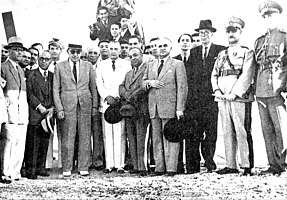Government of Ahmad Qavam (1946)
Ahmad Qavam became the Prime Minister of Iran on 27 January 1946, succeeding Ebrahim Hakimi.[1] Qavam who won the competition for office over Hossein Pirnia with 53 to 52 votes, was supported by the Tudeh fraction while deputies associated with the National Will Party voted against him, according to Jamil Hasanli.[2]
| Government of Ahmad Qavam | |
|---|---|
cabinet of Iran | |
 | |
| Date formed | 27 January 1946 |
| Date dissolved | 31 June 1946 |
| People and organisations | |
| Head of state | Mohammad Reza Shah |
| Head of government | Ahmad Qavam |
| No. of ministers | 12 |
| Member parties | |
| History | |
| Successor | Qavam VII |
He spent three weeks bargaining with the Shah over the composition of his cabinet,[3] and presented his ministers to the parliament on 17 February,[2] before his scheduled trip to Moscow, asking for postponement of the debates for vote of confidence until his return.[3] He deliberately returned just before the end of the 14th term, and expressed his regret for lack of time with "sardonic humor", in the last parliamentary session, when his ministers were approved.[3]
Qavam himself held ministries of Interior and Foreign Affairs; while according to Ervand Abrahamian "gave five cabinet posts to his close supporters; yielded two others to court favorites; and handed the War Ministry to General Amir Ahmedi... whose ambitions and independent mind had often disturbed the young shah".[3]
Cabinet
Members of Qavam's cabinet were:
| Portfolio | Minister | Took office | Left office | Party | Ref | |
|---|---|---|---|---|---|---|
| Prime Minister | Ahmad Qavam | 27 January 1946 | 31 July 1946 | Democrat Party | [2] | |
| Foreign Minister | Ahmad Qavam | 10 March 1946 | 31 July 1946 | Democrat Party | [2] | |
| Interior Minister | Ahmad Qavam | 10 March 1946 | 31 July 1946 | Democrat Party | [2] | |
| Deputy Prime Minister | Mozaffar Firouz | 10 March 1946 | 31 July 1946 | Democrat Party | [2] | |
| Agriculture Minister | Shamseddin Amir-Alaei* | 10 March 1946 | 31 July 1946 | Iran Party | [2] | |
| Culture Minister | Mohammad-Taqi Bahar | 10 March 1946 | 31 July 1946 | Democrat Party | [2] | |
| Finance Minister | Morteza-Qoli Bayat | 10 March 1946 | 31 July 1946 | Nonpartisan | [2] | |
| Justice Minister | Anoushiravan Sepahbodi | 10 March 1946 | 31 July 1946 | Nonpartisan | [2] | |
| Post & Telegraph Minister | Sahameddin Ghaffari | 10 March 1946 | 31 July 1946 | Nonpartisan | [2] | |
| Public Health Minister | Manouchehr Eghbal | 10 March 1946 | 31 July 1946 | Democrat Party | [2] | |
| Roads Minister | Hossein Firouz | 10 March 1946 | 31 July 1946 | Military | [2] | |
| Trade and Industry Minister | Ahmad-Ali Sepehr | 10 March 1946 | 31 July 1946 | Nonpartisan | [2] | |
| War Minister | Ahmad Amir-Ahmadi | 10 March 1946 | 31 July 1946 | Military | [2] | |
| Minister without portfolio | Ahmad Matin-Daftari | 10 March 1946 | 31 July 1946 | Nonpartisan | [2] | |
References
- Hess, Gary R. (March 1974), "The Iranian Crisis of 1945-46 and the Cold War" (PDF), Political Science Quarterly, Academy of Political Science, 89 (1): 117–146, JSTOR 2148118, archived from the original (PDF) on 2016-02-15, retrieved 15 February 2016
- Hasanli, Jamil (2006), At the Dawn of the Cold War: The Soviet-American Crisis over Iranian Azerbaijan, 1941–1946, Rowman & Littlefield Publishers, p. 209, ISBN 9780742570900
- Abrahamian, Ervand (1982). Iran Between Two Revolutions. Princeton University Press. pp. 222–223. ISBN 0-691-10134-5.